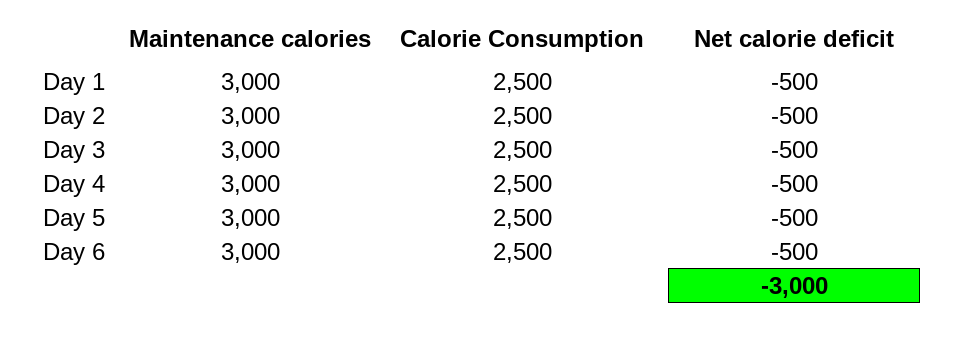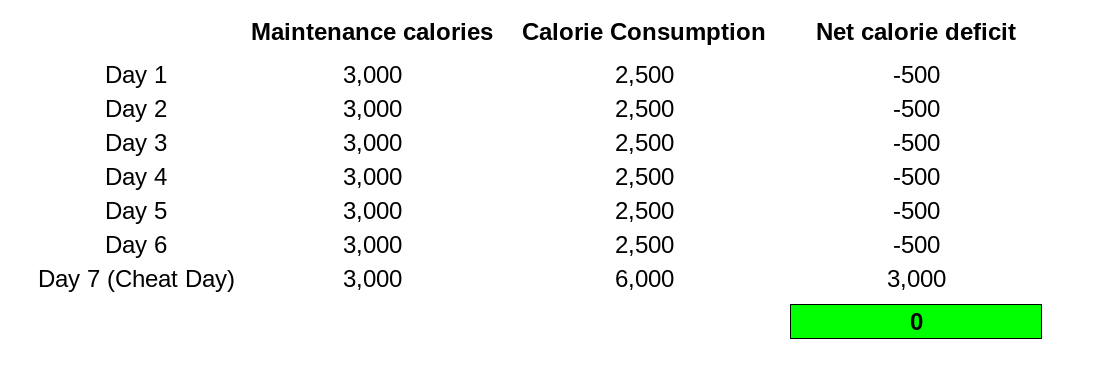Will a Cheat Day Ruin Your Weight Loss Progress?

You’ve worked hard all week to maintain your calorie deficit.
You counted calories and stayed consistent with your nutrition.
You hit every single strength training workout you had planned.
You even made sure to get your daily 7.5K-10K steps.
Now that it’s the weekend (FINALLY 🙏), you’re thinking about having a cheat day.
After all…
You’ve earned it, right?
Work hard, play harder baby!
But then again, you’re not too sure about what a cheat day would do to your weight loss progress.
The very last thing you want to do is set yourself back.
Is it okay to have a cheat day?
I just want to start off by saying this…
As far as I’m concerned, the whole concept of cheat days or cheat meals kind of just sucks if you really think about it.
Anything with the word “cheat” in front of it makes it sound like you’re doing something bad, or that you shouldn’t be.
Cheating on a significant other, cheating in sports, cheating on a test.
Bad, bad, bad.
And in this case, having a cheat day makes it sound like you’re having an affair on your diet.
You automatically label foods as either “good” or “bad.”
In your mind, “healthy” foods are what you should be eating most of the time and then you save “bad” foods for your cheat day, which is typically on the weekend.
But thinking about food in all-or-nothing, black-or-white terms is the exact opposite of how your mindset should be when it comes to weight loss.
So…While we’ll be covering the idea behind cheat meals, I’ll also be giving you an alternative to cheat meals, one that will help you form a better relationship with food.
What is a cheat day?
When someone mentions they’re having a cheat day, what do you think of?
Well, for one, you put the 1,200 calories you’ve been eating so far out of your mind.
You probably picture this giant stack of food from all of your favorite restaurants just piled to the ceiling.
We’re talking pizza, burgers, wings, fries, chips, cookies, donuts, cake, ice cream, candy…The works.
And the list could go on.
And on.
AND ON…
But you get the idea.
In your mind, a cheat day = food paradise.
And each and every bite is like a little sliver of vacation in your mouth that puts all the stress you went through during the week further and further out of your mind.
It’d be awesome if a day like that could actually increase your metabolism, wouldn’t it?
Some people say it can but is it really true?
Let’s talk about it…
Are cheat days good for you? Do cheat meals boost metabolism?
You’re typically going to consume more carbs than normal on your cheat meal or cheat day.
Carbs spike leptin, which is a hormone that, over the long term, can help manage your appetite and speed up your metabolism.
Perfect, that means your cheat day is actually a positive 🙏🏾
Hold on just a second.
Your leptin levels don’t stay elevated for very long at all.
Any benefit you’d receive in terms of reduced hunger or a boost to your metabolism is virtually nonexistent.
The quick spike in leptin would be like charging your phone for 30 seconds.
How much of a benefit would that really be?
So, for one, it doesn’t make your metabolism any faster (If you want to increase your metabolism, eat more protein).
And two, if you think about the astronomical number of calories you’re probably consuming on a cheat day, it can do A LOT more harm than good when your goal is staying in a calorie deficit.
How to know if your cheat day is ruining your diet
The truth about weight loss is that calories still count, even if you’re not counting them on a cheat day.
From here on out, don’t make the weight loss mistake of thinking a cheat day or cheat meal means getting a calorie deficit hall pass.
As long as 2+2 = 4 (FOREVER), the golden rule of weight loss will still hold true.
Losing weight comes down to being in a calorie deficit.
AKA you have to be taking in fewer calories than you burn.
Everyone’s calorie needs are obviously different…
So whether or not your cheat day is ruining your calorie deficit depends on YOU, the individual.
Lucky for you, the simple three-step process below will help you determine if your cheat day or cheat meal are holding you back from seeing the weight loss progress you want.
1. Calculate your maintenance calories and deficit calories
The first step is figuring out your maintenance calories and then your deficit calories.
I linked to this post at the very beginning of this article but HERE IT IS AGAIN.
Read through that to get your maintenance and deficit calories if you don’t already have them then come right back here.
Let’s say you came up with 3,000 for your maintenance calories and 2,500 calories for your deficit calories.
That means 6 days out of the week, you’d have a deficit of 3,000 calories (we’re excluding your cheat day for now).
The math for that is below:

2. Figure out your cheat day calories
The second step is calculating how many calories you’re consuming on your cheat day.
You can use an app like MyFitnessPal and just log everything you normally eat on a cheat day.
Let’s say that comes out to 6,000 calories.
That means on your one cheat day, you’re eating 3,000 calories above your maintenance.
This would put you in a 3,000 calorie surplus.

3. Determine your weekly calorie balance
The third step is figuring out where you stand overall in terms of net calorie balance for the week.
For the first 6 days, you were in a net calorie deficit of 3,000 calories.
Then, your one cheat day puts you in a surplus of 3,000 calories.
So, based on our example…
Your one cheat day would be offsetting the other 6 days of the week you’re in a calorie deficit.

A better way to think about cheat meals
The whole weight loss process can be draining sometimes, especially if you’ve been in a calorie deficit for a while.
And you view a cheat day as your “reward” for staying consistent with things.
As I mentioned at the very beginning, I’m not a big fan of the idea of cheat days.
You don’t think of good things when something has the word “cheat” in front of it.
It conditions you to demonize certain “bad” foods and tell yourself you can only have them on your cheat day.
The truth is:
- There is no such thing as “good” or “bad” foods and you don’t have to think about nutrition in all-or-nothing terms.
It doesn’t matter what it is, any (and I mean ANY) food can be had within a diet, as long as you do so in moderation.
- Refeed days are a muuuuuch better alternative to cheat days. You still get to eat more food on refeed days while staying on track with your weight loss goals.
What are refeed days?
A calorie deficit is a requirement for weight loss, that much you know.
But are you aware of the fact you don’t have to be in a calorie deficit every single day of the week to see progress?
Being in a net calorie deficit for the week is what counts.
And that’s where refeed days come in.
On refeed days, you bump your calories up to maintenance or maybe even slightly above to a surplus one or two days out of the week.
Using our example from earlier, let’s say:
- Your deficit calories are 2,500
- Your maintenance calories are 3,000
- You plan on having a couple refeed days a week
Here’s what that would look like:

Do you see how being in a deficit five days out of the week with two refeed days where you’re getting to eat MORE FOOD still puts you in a net calorie deficit for the week?
That means you’ll still be losing weight.
Keep this in mind about refeed days…
They’re not days where you eat like you’re at a buffet for every meal and splurge without counting your calories.
Refeed days are a calculated increase in calories, so you should still be tracking your nutrition and monitoring your progress.
Here’s another thing to keep in mind…
Because you’re increasing your calories a day or two a week, weight loss might be a tad bit slower.
But that’s an insanely small tradeoff if it helps you be more consistent with maintaining a calorie deficit.
Sustainability is the name of the game and leads to long-term results.
Where should the extra calories come from on your refeed days?
I’d recommend putting the majority of those extra calories toward carbs.
If you’re like: “Woah woah woah, won’t carbs make me fat?”
Nope.
Extra carbs will provide you with more energy for your strength training workouts in the days that follow 💪
Diet cheat day FAQs
How many cheat days ruin a diet? How often can you have a cheat day without gaining weight?
Depending on how many calories you consume during your cheat days, you could just be undoing all the progress you make.
You can go a few sections up and calculate and walk through a simple three-step to determine if your weekly cheat day or cheat meal is preventing you from being in a calorie deficit and losing weight.
Will my weight go back to normal after a cheat day?
If you’re wondering whether one random day or weekend of binge eating will ruin your progress…
Not at all.
You may be up a few pounds for the next few days but it’ll normalize, assuming you get back on track.
Keep in mind weight loss isn’t linear and the scale fluctuates on a daily basis for a variety of reasons, regardless of if you have a cheat day or not.
Now, if you’re not seeing the progress you want, your weekly cheat day could be what’s holding you back.
So you’ll have to make some adjustments to your nutrition.
*** Hint hint: Start using refeed days instead of cheat days ***
Is it OK to have a cheat day once a week?
Everyone’s calorie needs are different so I can’t tell you whether or not YOUR specific cheat day is blocking you from losing weight.
What’s your net calorie deficit for the week?
If you’ve accumulated a deficit of, let’s say, 3,000 calories over six days but then your one cheat day results in a 3,000 calorie surplus, you’d net out to 0 progress made.
What should I do the day after a cheat day?
You know that I don’t like the term cheat day by now.
So, let’s reframe this to: What should I do the day after a refeed day?
Here’s what you do…
Absolutely nothing out of the ordinary.
You stick to the same way you’ve been eating while in a calorie deficit.
If you have a workout planned that next day, do that.
If it’s a rest day for you, just make sure you’re getting some daily movement and staying on track with your nutrition.
That’s it.

What's up?
I’m Chad, I’m happy you’re here! I’m a certified personal trainer and my goal is to help you form practical, sustainable habits that lead to lifelong fitness results. If you want to lose fat, build muscle, and live a healthier, happier life then you’re right where you need to be. 💪🏾
Free resources
⬇⬇⬇







0 Comments